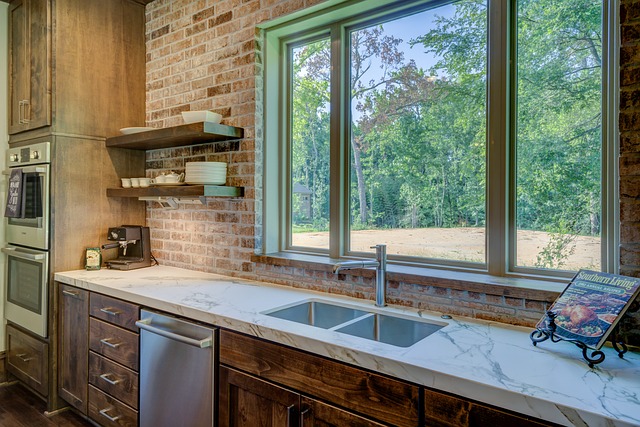Homeowners embracing green kitchen design have a range of eco-friendly countertop options, including recycled glass, quartz, and paper composites, which offer both aesthetic versatility and significant environmental benefits. These materials reduce waste, energy consumption, and resource demand while providing durability, low maintenance, and heat resistance. Installation requires careful planning and preparation, with proper maintenance ensuring the longevity and pristine condition of these sustainable choices, enhancing both kitchen aesthetics and environmental responsibility.
“Embracing a sustainable approach to your kitchen redesign? Discover the allure of green kitchen design through eco-friendly countertop installations. This article explores the trendsetters in recycled glass, quartz, and paper composites, highlighting their benefits as viable alternatives to traditional materials. From material selection to installation and maintenance tips, we guide you through the process, ensuring a long-lasting, aesthetically pleasing, and environmentally conscious space.”
Understanding Green Kitchen Design: The Push for Sustainable Countertops
In today’s eco-conscious world, the push for sustainable and environmentally friendly practices has permeated every aspect of home design, with one prominent area being kitchen countertops. The concept of green kitchen design is not just a trend but a responsible approach that aims to reduce the environmental impact of our daily routines. When it comes to countertops, this means exploring options that are both aesthetically pleasing and eco-conscious.
Recycled glass, quartz, and paper composites top the list as innovative materials that seamlessly integrate into green kitchen design. These materials not only offer a vast array of colors and textures but also significantly reduce waste and energy consumption compared to traditional countertop manufacturing methods. By choosing these sustainable alternatives, homeowners contribute to a smaller carbon footprint, ensuring their kitchens become both stylish and eco-friendly hubs.
Benefits of Recycled Glass, Quartz, and Paper Composites in Countertop Installation
Recycled glass, quartz, and paper composites offer a sustainable and stylish option for countertop installation, aligning perfectly with the trends in green kitchen design. One of the primary benefits is their environmental friendliness; using recycled materials reduces the demand for new resources, minimizes waste, and cuts down on the energy required for production. This eco-conscious approach not only contributes to a greener planet but also appeals to those seeking to reduce their carbon footprint.
Moreover, these materials are highly durable and low-maintenance, making them ideal for high-traffic areas like kitchens. Recycled glass and quartz countertops are known for their scratch and stain resistance, ensuring they remain pristine for years. Paper composites, with their unique composite structure, offer excellent impact resistance and heat insulation, providing both functionality and aesthetics in a single product.
Materials: Exploring Recycled Glass, Quartz, and Paper Composites for Countertops
In the pursuit of sustainable and eco-friendly kitchen design, materials play a pivotal role in shaping our choices. When it comes to countertops, options like recycled glass, quartz, and paper composites offer not only an environmentally conscious approach but also unique aesthetics and durability. Recycled glass countertops are crafted from repurposed wine bottles and other glass waste, transforming discarded items into stunning, glossy surfaces that reflect light, adding a touch of sparkle to any green kitchen design. Quartz countertops, on the other hand, are made from a combination of ground quartz and resin, providing a wide range of colors and patterns while ensuring high resistance to stains and scratches, making them ideal for busy households.
Paper composites, an innovative choice in sustainable materials, are created by blending recycled paper with resins and other compounds, resulting in a material that mimics the look of granite without the environmental impact. These countertops offer exceptional durability and heat resistance, suitable for both functional and stylish kitchens. Incorporating these eco-friendly materials into your green kitchen design not only reduces your carbon footprint but also contributes to a healthier planet, making your home an environmentally conscious sanctuary.
Installation Process: Step-by-Step Guide to Eco-Friendly Countertop Placement
Installation Process: Step-by-Step Guide to Eco-Friendly Countertop Placement
Choosing recycled materials for your kitchen countertops is an excellent step toward green kitchen design, but the installation process requires careful planning and precision. Begin by gathering all necessary tools and supplies, including measuring tapes, level tools, safety gear, and the chosen countertop material—recycled glass, quartz, or paper composite. Create a detailed layout of your kitchen, marking the exact measurements for each countertop section. This step ensures a precise fit and minimizes waste during installation.
Next, prepare the surface by cleaning and ensuring it’s free from debris and grease. Place protective covering around the area to prevent damage from drill bits and other tools. Securely attach the countertops to the existing structure using appropriate adhesive or fastening hardware recommended for your chosen material. For recycled glass, a specialized epoxy might be required, while paper composites often use a strong, water-based adhesive. Once attached, fill any gaps with caulk to enhance durability and seal the surface.
Maintenance and Longevity: Ensuring Your Green Kitchen Countertops Last
When investing in recycled glass, quartz, or paper composite countertops for your green kitchen design, understanding proper maintenance is key to ensuring their longevity. These materials are durable and low-maintenance, but like any surface, they require regular care to preserve their beauty and functionality. For example, cleaning with mild soap and water is generally recommended, avoiding harsh chemicals that can etch or damage the countertop surface.
Regular sealing every 6-12 months helps protect against stains and moisture, which are especially important considerations in a kitchen environment. Proper maintenance not only keeps your countertops looking new but also ensures they withstand the test of time, making them a sustainable and smart choice for your green kitchen design.
Adopting a green kitchen design, especially with countertops made from recycled glass, quartz, or paper composites, offers both environmental and aesthetic benefits. These sustainable materials not only reduce waste but also provide durable, stylish options for your kitchen. By choosing eco-friendly countertops, you’re making a positive impact on the planet without compromising on quality or design. Embrace the trend and contribute to a greener future, one countertop at a time.
